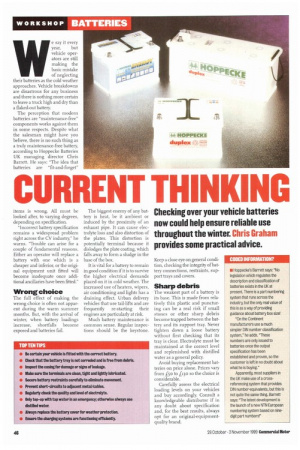CURRENT THINKING
Page 48

If you've noticed an error in this article please click here to report it so we can fix it.
Checking over your vehicle batteries now could help ensure reliable use throughout the winter. Chris Graham provides some practical advice.
Mr' e say it every year, but vehicle operators are still making the basic mistake of neglecting their batteries as the cold weather approaches. Vehicle breakdowns are disastrous for any business and there is nothing more certain to leave a truck high and dry than a flaked-out battery.
The perception that modern batteries are "maintenance-free" components works against them in some respects. Despite what the salesman might have you believe, there is no such thing as a truly maintenance-free battery, according to Hoppecke Batteries UK managing director Chris Barrett. He says: "The idea that batteries are "fit-and-forget"
items is wrong. All must be looked after, to varying degrees, depending on specification.
"Incorrect battery specification remains a widespread problem right across the CV industry," he warns. "Trouble can arise for a couple of fundamental reasons. Either an operator will replace a battery with one which is a cheaper and inferior, or the original equipment unit fitted will become inadequate once additional ancillaries have been fitted."
Wrong choice
The full effect of making the wrong choice is often not apparent during the warm summer months. But, with the arrival of winter, when battery loadings increase, shortfalls become exposed and batteries fail. The biggest enemy of any battery is heat, be it ambient or induced by the proximity of an exhaust pipe. It can cause electrolyte loss and also distortion of the plates. This distortion is potentially terminal because it dislodges the plate coating, which falls away to form a sludge in the base of the box.
It is vital for a battery to remain in good condition if it is to survive the higher electrical demands placed on it in cold weather. The increased use of heaters, wipers, air conditioning and lights has a draining effect. Urban delivery vehicles that use tail-lifts and are frequently re-starting their engines are particularly at risk.
Much battery maintenance is common sense. Regular inspections should be the keystone. Keep a close eye on general condition, checking the integrity of battery connections, restraints, support trays and covers.
Sharp debris
The weakest part of a battery is its base. This is made from relatively thin plastic and puncturing can be a real risk if small stones or other sharp debris become trapped between the battery and its support tray. Never tighten down a loose battery without first checking that its tray is clear. Electrolyte must be maintained at the correct level and replenished with distilled water as a general policy.
Avoid buying replacement batteries on price alone. Prices vary from ko to £130 so the choice is considerable.
Carefully assess the electrical loading levels on your vehides and buy accordingly_ Consult a knowledgeable distributor if in any doubt about specification and, for the best results, always opt for an original-equipmentquality brand. CODED INFORMATION?
• Hoppecke's Barrett says: "No legislation which regulates the description and classification of batteries exists in the UK at present There is a part numbering system that runs across the industry, but the only real value of this is as a way of providing guidance about battery box size "On the Continent manufacturers use a much simpler DIN number classification system," he adds. "These numbers are only issued to batteries once the output specification has been established and proven, so the customer is left in no doubt about what he is buying."
Apparently, most suppliers in the UK make use of a crossreferencing system that provides DIN number-equivalents, but this is not quite the same thing. Barrett says: "The latest development is the launch of a new NTN European numbering system based on ninedigit part numbers"
TOP TEN TIPS
• Ile certain your vehicle is fitted with the correct battery.
• Check that the battery tray is not corroded and is free from debris.
• Inspect the casing for damage or signs of leakage.
• Make sure the terminals are clean, tight and lightly lubricated.
• Secure battery restraints carefully to eliminate movement.
• Prevent short-circuits to adjacent metal/cables.
• Regularly check the quality and level of electrolyte.
• Only top-up with tap water in an emergency; otherwise always use distilled water.
• Always replace the battery cover for weather protection.
• Ensure the charging systems are functioning efficiently.
















































































































